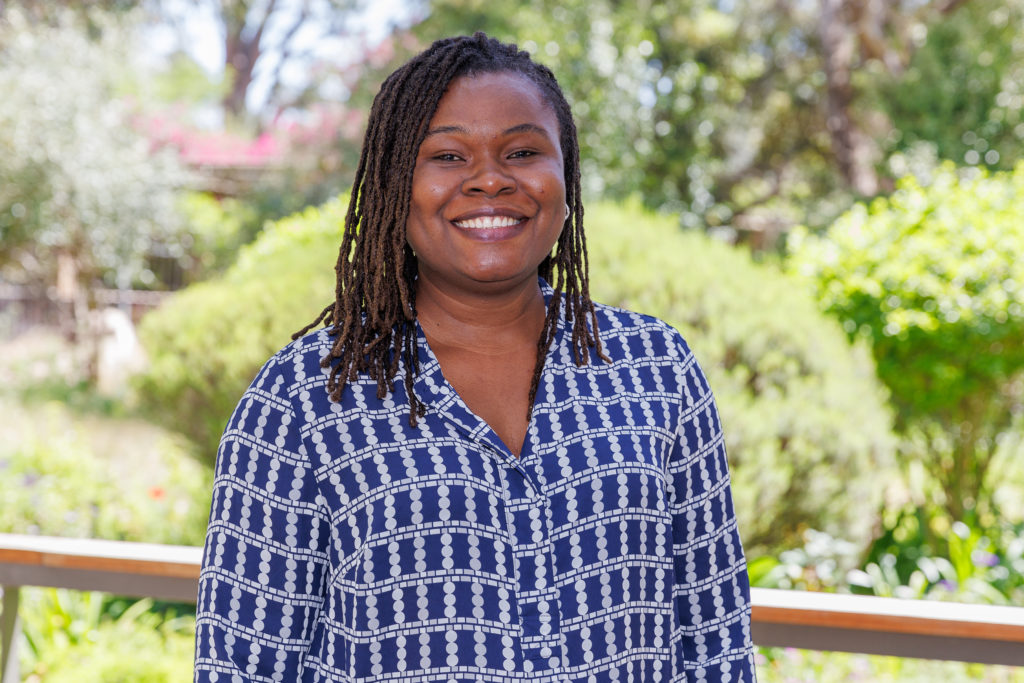“Seeing fiction as a representation of life makes it possible to get a sense of a people’s world view by looking at their oral narratives. What do African oral narratives tell us about African perceptions of the relationship between sexuality and disability? Using Amos Tutuola’s fiction, which borrows a great deal from folktales (in fact, some of them are adaptations of folktales), I argue that traditional African societies are multivalent/conflicted in their valuing of the sexuality of bodies with disabilities,” said Ifeyinwa Okolo of the Department of English and Literary Studies, Federal University Lokoja, Nigeria.

Okolo is an Iso Lomso fellow currently in her final residency. As part of the fellowship, she spent three months in 2021 at the National Humanities Center in North Carolina in the United States. She has also recently been promoted to Associate Professor. Her project looks at the intersection of disability and sexuality in African fiction. The overall aim is to humanise bodies with disabilities by understanding their depiction in literature and, in particular, their depiction as sexual beings. “A lot of the time we have mixed emotions when it comes to disability and sexuality,” she said. “We find it hard to imagine a person with a disability in a sexual situation. We may even experience some revulsion at the idea of disabled bodies being sexual – feeling they are crossing boundaries they shouldn’t cross. We are not always as open to it as we might hope.”
The work on Amos Tutuola forms one chapter of her book. Tutuola is a Nigerian writer and journalist who wrote books in English based on Yoruba folktales. He died at the age of 76 in 1997. His works have been translated into 11 languages, including French, German, Russian and Polish.
“Tutuola is known for adapting, experimentation and the retelling of folktales,” said Okolo. “His fiction draws from identifiable stories from many African cultures. They tell us a lot about what people believe and what their lives are about.”
“Different African cultures will be familiar with the stories,” she added. “ Tutuola tells tales that are familiar across African cultures. The stories also deal with common themes, for example, journeying to the land of spirits.”
“I choose to look at his work from the prism of Africanjujuism,” she explained. “It’s a blending of African spiritualism, cosmologies and imagination. A blurring of the lines between the human, non-human and spirit worlds – the unborn, living, dead and ancestors, set in typically African timing that is not linear but cyclic.”
Africanjujuism is a term that was coined by the Nigerian-American novelist Nnedi Okorafor to describe a sub-category of fantasy centred on African life as lived on the continent and incorporating African tradition and culture.
Explaining the link to disability, Okolo pointed out that the non-human world often “thrives on the grotesque. Tutuola plays with a range of disabilities that elicit different responses. Some disabilities are traditionally linked with ideas of possessing spiritual powers – like blindness, albinism and dwarfism. There is an idea that such people can see into other worlds and realities, and thus they often have a special place in folktales”.
Bodies differently abled
Okolo looked in detail at four of Tutuola’s works – The Palm-Wine Drinkard, My Life in the Bush of Ghosts, Feather Woman of the Jungle and The Brave African Huntress.
In The Palm-Wine Drinkard, she pointed to double standards in dealing with disability with taboos about marrying the disabled and initial acceptance of body imperfection and incompleteness changing into the need to be rescued from disability. My Life in the Bush of Ghosts considers beauty in disability asking what beauty is and who is actually disabled? Feather Woman of the Jungle considers the choice to imitate disability but also the agency of disability as the character is simultaneously powerful and powerless. And in The Brave African Huntress, femininity is presented as a disability or deficiency. “Females are not expected to show such bravery,” said Okolo. “And although the huntress is initially driven away she is not devalued and eventually overcomes the obstacles in her path and succeeds in her quest. Confirming femininity as worthy, able to hold its own, not needing to be rescued by a knight”.
“Tutuola’s folktales do not create a mono-narrative of disabled bodies and sexuality but put the bodies to different uses in different stories. They are good, bad, funny, serious, benevolent, malevolent and everything in between but, (and this is key to my argument) they have their place – a humanising space where they stand in their own truths/realities. Tutuola’s stories do not bring us ‘dis’-abled bodies but rather differently-abled bodies that have their challenges but find their way around these challenges to create the space for acceptance or normalisation of difference.”
“In so doing he provides a lens on notions of disability on the continent. He offers a middle ground, recognition of what is but also asking what if. In humanising disability he is not just bringing out the good but rather recognising the good, bad and ugly, and accepting that all have a place. Perfection is not what makes a human.”
In discussion, Okolo was asked about the reading of Tutuola’s work as that of a first-generation, post-independence writer and a critique of colonialism as well as interpretations of his work as science fiction as opposed to folklore.
“I can understand why it is seen as science fiction,” she said. “Literature is open to all kinds of reading and interpretation. I prefer to see it as Africanjujuism – bringing African experience to the pages, exploring a narrative with which we are familiar and preserving stories that are lost and forgotten with some twisting to accommodate and absorb new realities and the encroachment of other cultures. Folktales as living things.”
Michelle Galloway: Part-time media officer at STIAS
Photograph: Anton Jordaan
